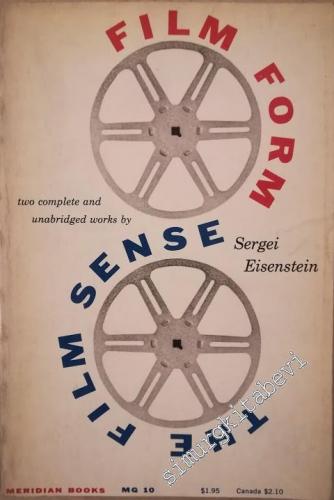#smrgSAHAF Film Form: Essays in Film Theory and The Film Sense, Two Complete and Unabridged Works - 1957

he great amount of writing accomplished by Eisenstein during his short life bound together these two threads of his work. The film-teacher examined, analyzed and defended the lilm-maker's work; the film~ teacher often exercised his theories in print before subjecting them to more strenuous trials. Before his death in 1948 Eisenstein planned a Russian edition of all his best theoretical writing, and drafted an introduction for it. Most of those principal essays are included in this American reprint of his FILM FORM and THE FILM SENSE, and it seems fitting for Eisenstein himself to introduce an essay collection that can be of such service to film students. The following passages are translated from his draft introduction (dated at Moscow-Kratovo, August 1946), lirst published in a 1956 Russian edition of his essays.
If there is any hint of his serious illness, or of his awareness that he might not be able to make another film, it is well concealed here. The dominant note is a hopeful one. In speaking of television and all technological change in film production, he says to film makers and film students, "We need fear nothing from their advance," - so long as we learn all that past and present offer to the future. - J.L. April, 1957
he great amount of writing accomplished by Eisenstein during his short life bound together these two threads of his work. The film-teacher examined, analyzed and defended the lilm-maker's work; the film~ teacher often exercised his theories in print before subjecting them to more strenuous trials. Before his death in 1948 Eisenstein planned a Russian edition of all his best theoretical writing, and drafted an introduction for it. Most of those principal essays are included in this American reprint of his FILM FORM and THE FILM SENSE, and it seems fitting for Eisenstein himself to introduce an essay collection that can be of such service to film students. The following passages are translated from his draft introduction (dated at Moscow-Kratovo, August 1946), lirst published in a 1956 Russian edition of his essays.
If there is any hint of his serious illness, or of his awareness that he might not be able to make another film, it is well concealed here. The dominant note is a hopeful one. In speaking of television and all technological change in film production, he says to film makers and film students, "We need fear nothing from their advance," - so long as we learn all that past and present offer to the future. - J.L. April, 1957












